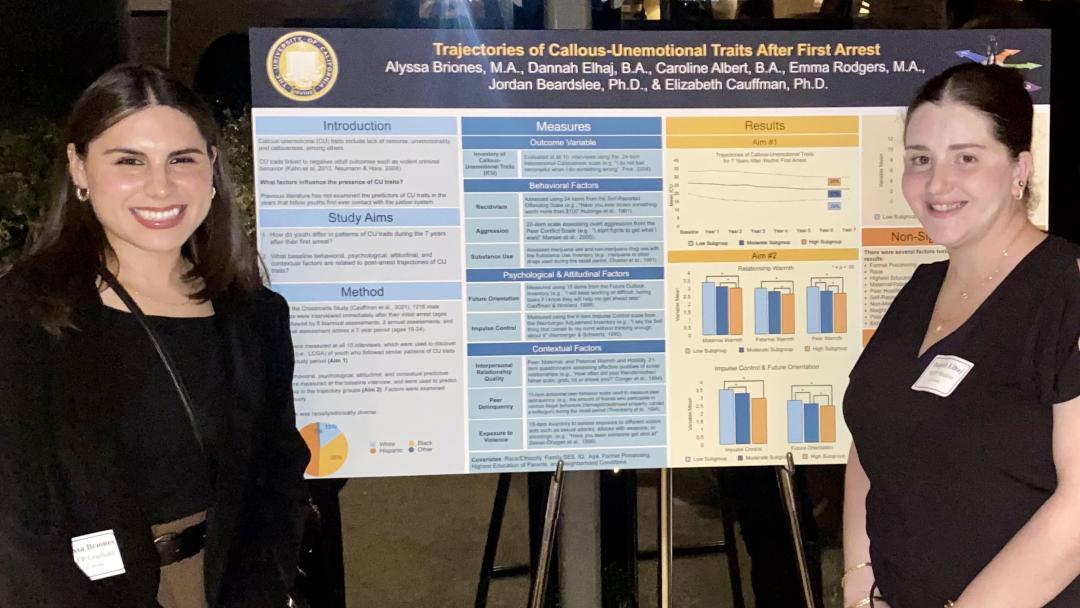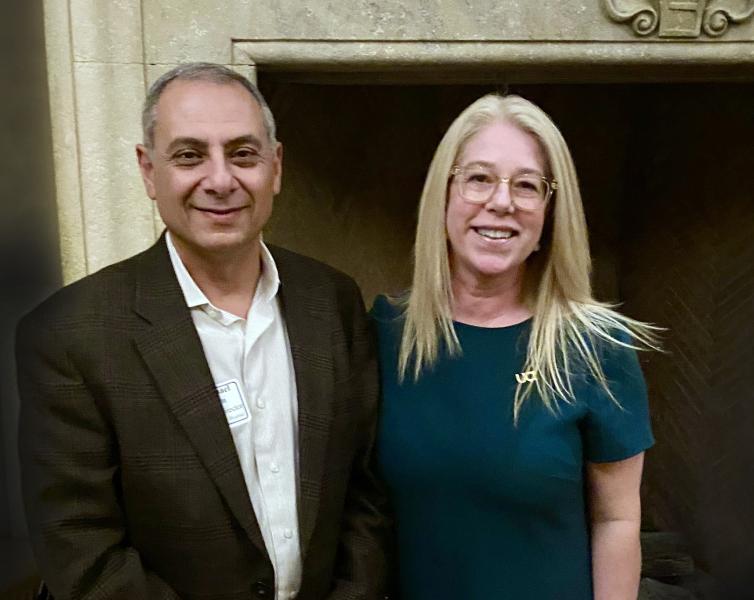
Alyssa Briones, left, and Dannah Elhaj won this year's Center for Psychology and Law poster contest. Inset photo: The center's new Distinguished Fellows are Michael Barsom, left, and Jennifer Friend.
Student poster examines callousness after first arrest
Dannah Elhaj, a student in the Master of Legal and Forensic Psychology (MLFP) program, and MLFP alumna Alyssa Briones have won the annual Center for Psychology and Law poster contest for their research on the lack of emotional traits of young people after their first arrest.
Titled “Trajectories of Callous-Unemotional Traits After First Arrest,” the poster focuses on callous-unemotional (CU) traits, which include lack of remorse, lack of emotion, and callousness.
“Previous literature has not examined the predictors of CU traits in the years that follow youths’ first ever contact with the justice system,” Elhaj explains. “Our study examined two questions. First, we studied the extent to which youth differ in their patterns of CU traits during the 7 years after their first arrest. Second, we examined the psychological, attitudinal and contextual predictors of subsequent CU traits. In general, we found that most youth declined in their CU traits over the course of the study, but that youth varied in their rate of decline. Furthermore, we found that the youth who had the slowest rate of decline had the highest risk factors at baseline, or shortly after their first arrest.”
Elhaj credits her research team — Briones, Caroline Albert and Emma Rodgers— for helping to produce the winning poster.
Second place honors went to Curtis Smith, Ph.D. student in psychological science for his poster: “The Role of Ethnic Identity in Preserving Justice-Involved Black Male Youths' Future Expectations Following Victimization.”
Third place went to Laura Fulton, Ph.D. student in psychological science for her poster: “Children's and Adolescents’ Disclosures of Negative Events.”
Receiving honorable mentions were psychological science Ph.D. students Scarlet Cho, Isaias Contreras, Sarah Kim, Imani Randolph, Emma Simpson and Emily Sutton.
New Distinguished Fellows
 The students’ posters were on display at a recent reception, where Elizabeth Cauffman, professor of psychological science, introduced the new Center for Psychology and Law Distinguished Fellows — alumna Jennifer Friend (’95, B.A., social ecology), CEO of Project Hope Alliance, and Dr. Michael Barsom, executive director of the Metropolitan State Hospital.
The students’ posters were on display at a recent reception, where Elizabeth Cauffman, professor of psychological science, introduced the new Center for Psychology and Law Distinguished Fellows — alumna Jennifer Friend (’95, B.A., social ecology), CEO of Project Hope Alliance, and Dr. Michael Barsom, executive director of the Metropolitan State Hospital.
The Distinguished Fellows program is the premier professional engagement program of the Center for Psychology and Law. Its purpose is to connect senior community leaders to graduate students and alumni in psychology and law. Distinguished Fellows are invited to contribute their time and expertise through serving on the center’s advisory board, providing professional mentorship of current graduate students, collaborating with center faculty to provide a “Views By Two” presentation, and attending a policy briefing in the spring.
“The center’s goal is to bridge the gap between scientific evidence and public policy,” says Cauffman, the center’s director. “That’s what we do, foster collaboration between academics, legal professionals, policy makers and the general public. At the heart of everything we do is collaboration. Building a network of people. Policies can be made better by science. And science can be made better by learning from the people with real life experience.”
Friend and Barsom agree.
“Policy informed by science is very dear to me,” Barsom says. “Much of what I do today in the state hospital is deal with some very difficult situations and we make decisions, informed by science. The system needs improvement and science is the way forward. I’m honored to be involved. Teaching students is how we move forward to improve delivery of care.”
For Friend, who was a homeless child and now works to end homelessness, serving as a Distinguished Fellow is one way she gives back to her community.
“Our ability to learn is only as good as our utilization of our education and our community,” she says. “For me, the intersectionality of having gone to law school, having gone to UCI as a Pell Grant student, as someone who had experienced homelessness in Orange County and worked 50 hours a week while going to school full-time, I didn’t really understand why i had the story that I had. But when I was in the School of Social Ecology, I started seeing how it was that all of these seemingly disparate systems come together to make real substantial and lasting change. I think that the magic is bringing science, policy and solutions together.”
— Mimi Ko Cruz